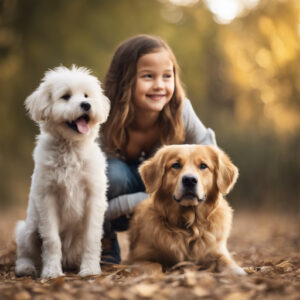 Choosing the right dog breed for a family with young children requires careful consideration of various factors. The ideal family dog should be tolerant, affectionate, and possess the physical and emotional resilience needed to thrive in a bustling home environment.
Choosing the right dog breed for a family with young children requires careful consideration of various factors. The ideal family dog should be tolerant, affectionate, and possess the physical and emotional resilience needed to thrive in a bustling home environment.
Additionally, it is crucial that these dogs can safely interact with energetic, sometimes unpredictable, little ones. Here’s a detailed examination of the top ten dog breeds that generally excel in family settings with young children.
1. Labrador Retriever
 Widely regarded as one of the best family dogs, the Labrador Retriever’s friendly disposition makes them particularly appealing to families. Labs are known for their affable nature, high energy levels, and intelligence. They are incredibly patient, which can help ease interactions with toddlers and young children who may be less aware of their surroundings.
Widely regarded as one of the best family dogs, the Labrador Retriever’s friendly disposition makes them particularly appealing to families. Labs are known for their affable nature, high energy levels, and intelligence. They are incredibly patient, which can help ease interactions with toddlers and young children who may be less aware of their surroundings.
Labradors love to engage in play, be it fetch or swimming, making them perfect companions for active families. Their need for regular exercise can align well with a family lifestyle, as they thrive on daily walks or playtime in the garden.
2. Golden Retriever
 Golden Retrievers are renowned for their gentle demeanor and loyalty, which often makes them a top choice for families. Their calm nature and patience with kids help create a nurturing environment. Known for being intelligent and easy to train, Golden Retrievers can learn household commands efficiently, adding an element of safety and reliability.
Golden Retrievers are renowned for their gentle demeanor and loyalty, which often makes them a top choice for families. Their calm nature and patience with kids help create a nurturing environment. Known for being intelligent and easy to train, Golden Retrievers can learn household commands efficiently, adding an element of safety and reliability.
Additionally, Golden Retrievers often exhibit a playfulness that resonates well with children. Their social and friendly characteristics make them an instant hit with the whole family, and they tend to thrive in active households.
3. Beagle
 Beagles offer a combination of friendliness, curiosity, and boundless energy, making them excellent family companions. Their smaller size can be advantageous for families with young children who may feel overwhelmed by larger dog breeds. Beagles are very social and get along well with children, often displaying the playful demeanor required for enjoyable interactions.
Beagles offer a combination of friendliness, curiosity, and boundless energy, making them excellent family companions. Their smaller size can be advantageous for families with young children who may feel overwhelmed by larger dog breeds. Beagles are very social and get along well with children, often displaying the playful demeanor required for enjoyable interactions.
With a natural inclination to be active, Beagles require regular exercise, which can promote family bonding through outdoor activities. Their playful nature makes them entertaining companions for children, providing opportunities for imaginative play.
4. Bulldog
 Bulldogs might not embody the conventional notion of an “active” dog, but their loving and laid-back personality makes them incredibly suitable for families. Bulldogs are known for their gentleness and protective instincts, often forming strong bonds with children. Their calm nature allows them to adapt well to various family activities, making them low-maintenance yet deeply affectionate family pets.
Bulldogs might not embody the conventional notion of an “active” dog, but their loving and laid-back personality makes them incredibly suitable for families. Bulldogs are known for their gentleness and protective instincts, often forming strong bonds with children. Their calm nature allows them to adapt well to various family activities, making them low-maintenance yet deeply affectionate family pets.
Due to their short, stocky build, Bulldogs are less likely to knock over young children and can serve as great companions for those curious little ones who are eager to explore.
5. Poodle
 Poodles come in various sizes (standard, miniature, and toy), making them versatile options for different living situations. They are highly intelligent and are considered one of the easiest breeds to train. Their hypoallergenic coat is a significant benefit for families with allergies and requires regular grooming, which can become a fun family activity.
Poodles come in various sizes (standard, miniature, and toy), making them versatile options for different living situations. They are highly intelligent and are considered one of the easiest breeds to train. Their hypoallergenic coat is a significant benefit for families with allergies and requires regular grooming, which can become a fun family activity.
Poodles are known for being playful and affectionate. They can be incredibly energetic, often appreciating activities like fetching or swimming, ensuring that they can keep up with children’s playtime while providing companionship.
6. Boxer
 Boxers are an energetic, playful breed that often exhibits a fun-loving nature. Their exuberance and loyalty make them excellent companions for families with young children. Boxers are known to be protective, which can provide parents with added peace of mind regarding their children’s safety.
Boxers are an energetic, playful breed that often exhibits a fun-loving nature. Their exuberance and loyalty make them excellent companions for families with young children. Boxers are known to be protective, which can provide parents with added peace of mind regarding their children’s safety.
Boxers thrive on regular exercise and interactive play, offering hours of entertainment and bonding opportunities. Their affectionate nature and patience make them a beloved addition to family life, and they typically adapt well to different living environments.
7. Bichon Frise
 For families seeking a smaller breed, the Bichon Frise could be a fantastic option. They are known for their friendly and cheerful disposition, making them inviting companions for children. Their smaller size helps to reduce physical accidents that can occur with larger breeds.
For families seeking a smaller breed, the Bichon Frise could be a fantastic option. They are known for their friendly and cheerful disposition, making them inviting companions for children. Their smaller size helps to reduce physical accidents that can occur with larger breeds.
Bichon Frises are typically playful and love engaging with children, often forming strong relationships with family members. Their hypoallergenic coat is another significant perk, allowing families with allergies to enjoy the companionship of a pet without health concerns.
8. Shih Tzu
 Shih Tzus are affectionate companion dogs that display a friendly and gentle temperament. They are well-suited to families with young children, as they are generally low-energy and enjoy being cuddled. Their manageable size makes them ideal for smaller spaces while still being sturdy enough to romp around with kids.
Shih Tzus are affectionate companion dogs that display a friendly and gentle temperament. They are well-suited to families with young children, as they are generally low-energy and enjoy being cuddled. Their manageable size makes them ideal for smaller spaces while still being sturdy enough to romp around with kids.
Shih Tzus require regular grooming due to their beautiful coats, which can become a delightful routine for older children, teaching them responsibility and care for pets. Their laid-back nature combined with their playful spirit makes them excellent family companions.
9. Cocker Spaniel
 Cocker Spaniels are known for their gentle and loving nature. They thrive on companionship and are typically great with children, making them classic family pets. The breed is naturally friendly, socialized well from an early age, and can adapt to family routines seamlessly.
Cocker Spaniels are known for their gentle and loving nature. They thrive on companionship and are typically great with children, making them classic family pets. The breed is naturally friendly, socialized well from an early age, and can adapt to family routines seamlessly.
With their playful and energetic personality, Cocker Spaniels enjoy walks, playdates, and games, helping families engage actively. These dogs also possess a high degree of trainability, further helping them fit into family dynamics smoothly.
10. Collie
 Collies are intelligent, loyal, and protective – attributes that make them excellent family dogs. They are known for their strong herding instincts and an innate ability to communicate, often creating bonds with children that are characterized by trust and affection.
Collies are intelligent, loyal, and protective – attributes that make them excellent family dogs. They are known for their strong herding instincts and an innate ability to communicate, often creating bonds with children that are characterized by trust and affection.
Collies thrive with constant social interaction and are happiest in active environments. They require regular exercise but are usually gentle with young children and patient when they are around. Their protective nature adds a layer of safety for families, allowing them to feel secure in their presence.
Conclusion
Selecting the right dog breed for families with young children is often a delicate balance of considering temperament, energy levels, and the overall compatibility of the breed with family life. The ten breeds mentioned above offer diverse options to match different lifestyles, ensuring a loving relationship between children and their canine companions.
Regardless of the breed selected, it is crucial to focus on proper training, socialization, and understanding the individual personalities of both the dog and the children. Establishing a nurturing environment allows families to enjoy the countless benefits of owning a dog, fostering lifelong memories filled with unconditional love, loyalty, and fun.